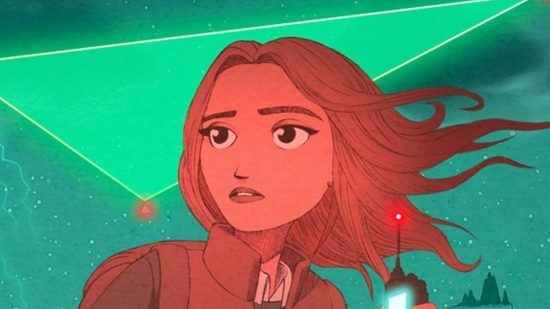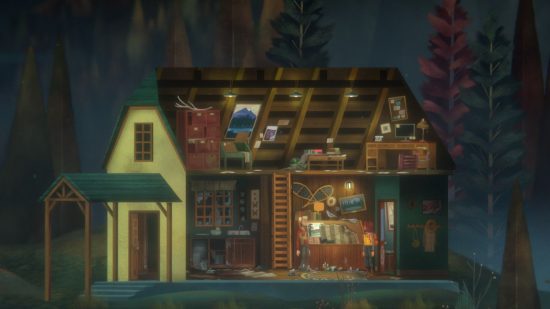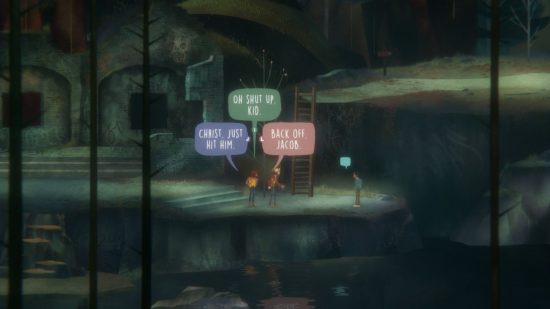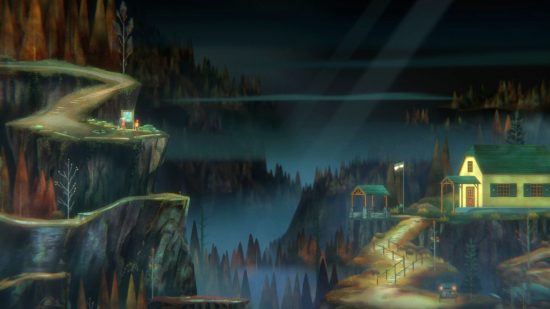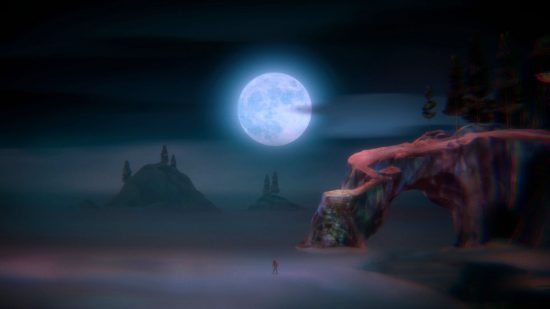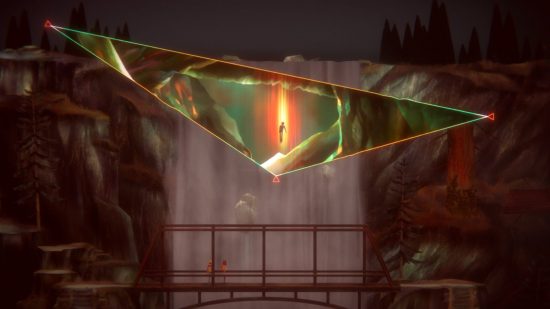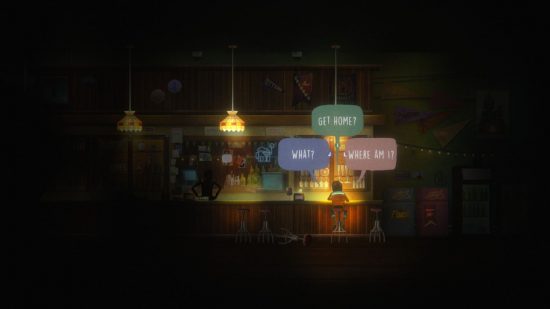Our Verdict
Oxenfree 2 casts off adolescence in a bid to explore the trials and tribulations of adulthood, featuring authentic dialogue that packs an emotional punch.
Our Oxenfree 2 review invites you to step into the worn and practical hiking shoes of Riley Poverley, as she returns to her hometown in order to, uh, close an interdimensional portal that threatens to destabilize the space-time continuum. No pressure.
Like its predecessor, Oxenfree 2 adopts the classic adventure game structure of exploration and light problem-solving, but conversation is the real engine propelling its plot. Night School Studio’s naturalistic approach to dialogue is alive and well, and while the original Oxenfree involved juggling the interpersonal drama of a teen friendship circle – forcing you to split your attention between five people at once – Oxenfree 2 partners Riley with Jacob, the self-described ‘local weirdo’ of Camena.
It’s well worth playing the original Oxenfree for the nuance and depth it lends to its sequel, but it’s by no means necessary. Jacob’s strong ties to Camena serve as the vehicle to quickly get Riley up to speed on the broad strokes: the untold truth of the USS Kanaloa disaster, Maggie Adler’s research, and the events that took place on Edwards Island half a decade ago. Equally, I don’t need to waste time waiting for characters to believe that Camena has a ghost problem; aside from some cursory reservations, these would-be paranormal investigators begrudgingly accept this state of affairs almost immediately.
However, it’s also apparent that Jacob is somewhat hapless and ill-equipped to charge around the Camena woodland on a quest to stop angry ghosts from tearing reality apart. You can respond to Jacob in various ways – either gently encouraging him while he’s out of his comfort zone, or heedlessly pushing on ahead with a scathing remark. Depending on your playthrough, you might consider him a 3am food friend or an outright hindrance as you progress. Of course, silence continues to be a viable option, giving Jacob the space to emotionally open up… or deliberately leave him hanging.
For all his faults, Jacob’s awkward ineptitude is a perfect foil to Riley’s curt pragmatism, and this careful balance results in a duo that’s well-rounded and humanely flawed. No matter how you choose to define their relationship, Riley and Jacob trade regrets, failures, hopes, and dreams. They discuss sunsets on Mars, the merits of library fines, and the ingrained existentialism after a childhood spent in a sleepy coastal town.
It’s clear from these conversations that Oxenfree 2’s dialogue system has received definite improvements. In Oxenfree, I often interrupted characters, even after waiting until the very last second to make my choice. Oxenfree 2 is a bit kinder and waits for them to finish speaking first. Interruptions only occur when it’s patently obvious that you’ve made a snap decision, or when otherwise appropriate – during a heated argument, or when characters are rambling, for example.
That said, this system is not perfect. While I was assured early on that conversations would continue while moving from area to area, there were a few times when this proved not to be the case. While revisiting conversations is part of the appeal of a second playthrough, the tutorial’s broken promise did leave me feeling a bit robbed, and I got into the habit of standing around and waiting for those conversations to play out.
Beyond the chit-chat, the landscape of Camena is beautifully rendered in Oxenfree’s distinctive style. Riley and Jacob traverse crepuscular woodland, dank caves, and dilapidated mining towns, and each location is suitably moody and rich with details. Their character models are often dwarfed by the sheer scope of these environments, and the brief moments where the camera creeps in close are typically reserved for particularly intimate or claustrophobic sequences. However, I found that the game’s subtitles occasionally obscured figures and focal points at the bottom of the screen.
Camena’s map is larger than Edwards Island, but exploring it feels like less of a trek. Oxenfree’s Alex would traverse the environment with caution, though her slow progress could cause frustration. In contrast, Riley is a seasoned hiker, capable of scaling rock faces and rappelling down cliffs with ease. Maggie Adler’s scattered letters also make a return in Oxenfree 2. These fragments of flavor text serve as Oxenfree’s collectibles, and previously required a lot of deliberate backtracking to earlier areas in order to collect them all. Thankfully, Oxenfree 2 introduces the letters early on, allowing you to really comb through each environment and pick them up as you go.
Thankfully, you’re not doomed to converse exclusively with Jacob for the entirety of your late-night hike, and Oxenfree 2 takes its cue from Firewatch with the surprise inclusion of a fully functioning walkie-talkie. This serves as your primary line of communication to Evelyn, the chirpy environmental researcher that enlists Riley’s help to analyze the unnatural phenomena of Camena. She’s joined on the radio waves by Nick, a retired fisherman that missed his calling, and Shelley, an on-duty park ranger fiercely dedicated to her job. Each of these tertiary characters has their own story that unfolds over the course of the night, and you can influence their outcome through your conversations – or by ignoring them at every turn.
Of course, it wouldn’t be Oxenfree without a portable radio, and Oxenfree 2’s frequencies are an ever-shifting menagerie of surrealism. One station consists of hissing static that resembles heavy breathing; another is a bored valley girl reporting on the latest school drama; yet another is a soporific radio play that hits the same tonal notes as The Twilight Zone. Unfortunately, between Jacob’s ever-present company and the spontaneous walkie-talkie chatter, there was scarcely any time afforded for me to scour each station uninterrupted. Instead, the radio is relegated to impromptu exorcisms and portal manipulation – and while these set pieces are just as arresting as they were the first time around, I missed scouring the frequencies for the latest unsettling looping soundbites.
Just like its predecessor, Oxenfree 2’s horror lies in the disconcerting moments where reality turns to molasses at the slightest provocation. These episodes are often punctuated by dissociative time loops that culminate in a mild jumpscare or two: the flickering of a CRT television as the channel is abruptly changed, flickers of memory that cascade into a nightmare before snapping back to the tranquil Oregan wilderness.
Half a decade may have passed since the events of Oxenfree, but the ‘80s movie aesthetic persists. Synth permeates Oxenfree 2’s soundscape, its low tones often oppressive and vaguely threatening. However, the sequel turns the tropes of a classic teen movie on its head by placing you in the shoes of the adults intent on undoing all their hard work. From the adult perspective, the teenage clique that appears in Oxenfree 2 are wayward cult members – “a bunch of underbaked human beings making underbaked life choices” as far as Riley and Jacob are concerned.
This shift in focus also facilitates mature conversations between adults that are profoundly touching, and resonate with me more than the teen melodrama of the game’s predecessor. “Every light is flipped on when you’re a kid, y’know? The lights of possibility. One by one, those lights get flicked off,” Nick ruminates, and it speaks to what comes after the coming-of-age tale.
Oxenfree 2 sits at the intersection of the supernatural and the mundane. Ordinary people wrestle with the trials and tribulations of an ordinary life alongside the supernatural forces that rally against them. Night School Studio’s acclaimed dialogue system and narrative formula are tried-and-true, and while Oxenfree 2 doesn’t stray too far from the beaten path, it still has something meaningful to say. Closing rifts between realities is hard; closing rifts between people is harder.
